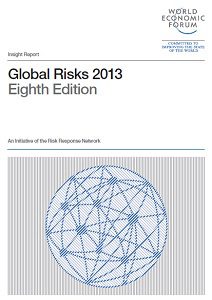 Wharton School professors contribute to study showing persistent economic malaise coupled with frequent extreme weather events are an increasingly dangerous mix Wharton School professors contribute to study showing persistent economic malaise coupled with frequent extreme weather events are an increasingly dangerous mixThe world is most at risk from the lingering financial crisis, deflecting attention from climate change at a time of increasing extreme weather events, according to the World Economic Forum’s Global Risks 2013 report. A survey of over 1,000 experts and industry leaders has identified the top two most prevalent global risks to be severe income disparity and chronic fiscal imbalances, reflecting on-going concerns about government debt. Respondents rated rising greenhouse gas emissions as the third most likely global risk overall.The failure of climate change adaptation was seen as the environmental risk with the most knock-on effects for the next decade. The report describes 50 global risks, grouped into categories: economic, environmental, geopolitical, societal and technological. Overall, the data reveal a slightly more pessimistic outlook for the coming 10 years. On a regional basis, experts in North America tended to see risks as more likely than experts in other regions. Younger respondents were more concerned than older respondents; women were more pessimistic than men. Developed with expert contributions from Marsh & McLennan Companies, Swiss Reinsurance Companies, Zurich Insurance Group, the Oxford Martin School (University of Oxford), the National University of Singapore and the Wharton Center for Risk Management (University of Pennsylvania), Global Risks 2013 is the flagship initiative of the World Economic Forum’s Risk Response Network, which provides private and public sector leadership with an independent platform to build resilience by mapping, monitoring and managing global risks. Global Risks 2013 includes a special report on national resilience, laying the groundwork for a new country resilience rating which would allow leaders to benchmark their progress. The report also highlights “X Factors” – emerging concerns that warrant more research. These include the rogue deployment of geoengineering and brain-altering technologies. These and three major risk cases – Health and Hubris, Digital Wildfires and Environmental/Economic Stress – are the focus of special sessions at the World Economic Forum Annual Meeting 2013 in Davos-Klosters, Switzerland, taking place on 23-27 January under the theme “Resilient Dynamism.” “GR2013 highlights the importance of fostering a culture of resiliency to cope with the increased frequency and intensity of risks that we face today,” notes Prof. Howard Kunreuther, James K. Dinan Professor and Co-Director of the Wharton Risk Management and Decision Processes Center. “To achieve this objective there is a need to develop long-term strategies with short-term incentives that enable us to take steps now to reduce future losses. We should take advantage of the human and environmental consequences of Hurricane Sandy and disasters in other parts of the world to initiate actions for addressing global problems such as ways to adapt to and mitigate the impacts of climate change.” “Eight years of tracking a large number of global risks worldwide, and how they interact with each other through interdependencies that we can now measure, has taught us three things,” says Dr. Erwann Michel-Kerjan, Managing Director of the Wharton Risk Center: “(a) it is possible to see them coming from afar and prepare your organization/country in a timely fashion; (b) risk management has become too important to be left to risk managers alone and is now being elevated to Board and Cabinet discussions as a core strategy; and (c) there are winners and losers in this more volatile and short-termism world, and the gap is already widening. Decision makers need to take informed actions.” Three major risk cases of global concern: 1. Health and Hubris 2. Digital Wildfires 3. Economy and Environment under Stress About the Wharton School and the Wharton Risk Management and Decision Processes Center Founded in 1881 as the first collegiate business school, the Wharton School of the University of Pennsylvania is recognized globally for intellectual leadership and ongoing innovation across every major discipline of business education. With a broad global community and one of the most published business school faculties, Wharton creates ongoing economic and social value around the world. The School has 5,000 undergraduate, MBA, executive MBA and doctoral students; more than 9,000 annual participants in executive education programs; and a powerful alumni network of 91,000 graduates. The Wharton Risk Management and Decision Processes Center at the Wharton School has for nearly three decades been at the forefront of basic and applied research to promote effective corporate and public policies for low probability events with potentially catastrophic consequences. The Center now includes 70 faculty, research fellows, and visiting scholars from all over the world to undertake large-scale initiatives. Providing expertise and a neutral environment for discussion, the Center team promotes a dialogue among industry, governments, interest groups and academics through its research and policy publications, seminars and forums. Research and more at http://www.wharton.upenn.edu/riskcenter/index.cfm. About the World Economic Forum The World Economic Forum is an independent international organization committed to improving the state of the world by engaging business, political, academic and other leaders of society to shape global, regional and industry agendas. Incorporated as a not-for-profit foundation in 1971 and headquartered in Geneva, Switzerland, the Forum is tied to no political, partisan or national interests (http://www.weforum.org). |
Media Coverage
|



